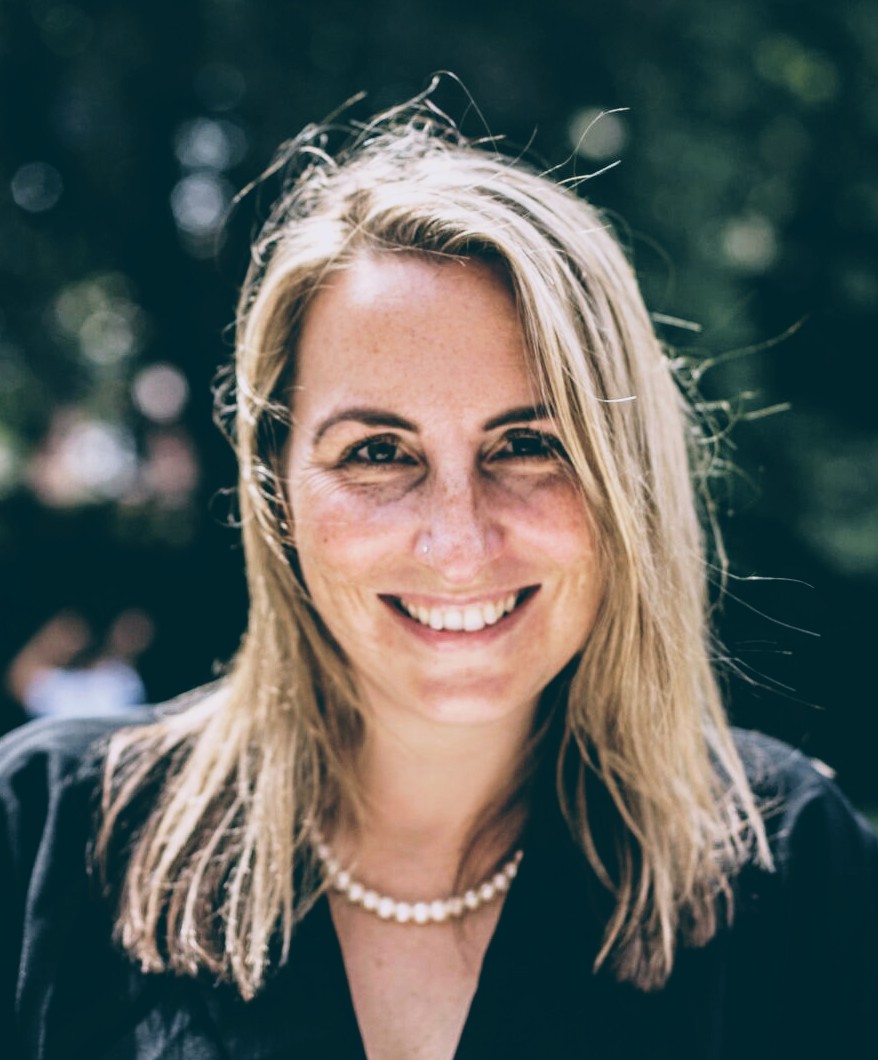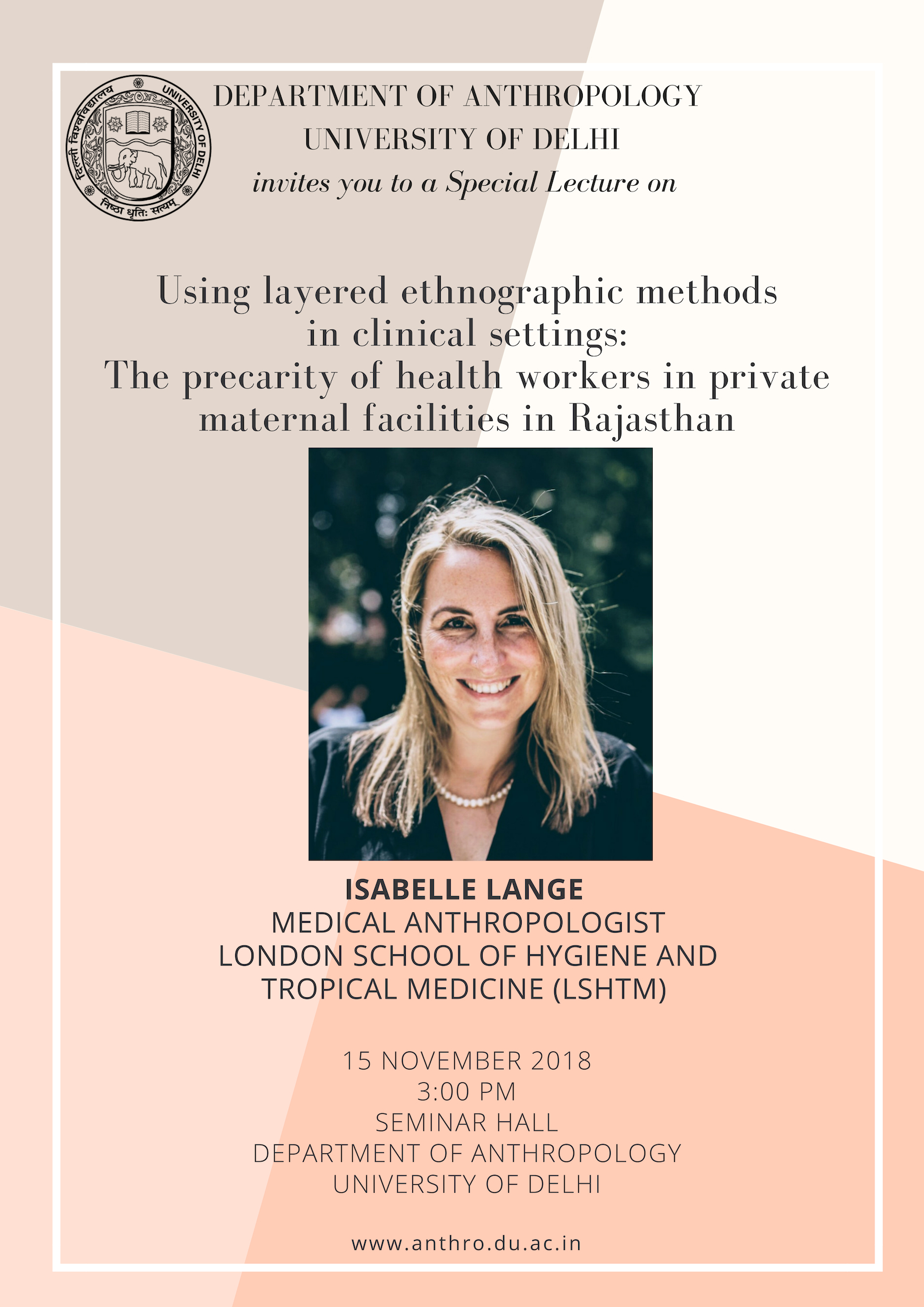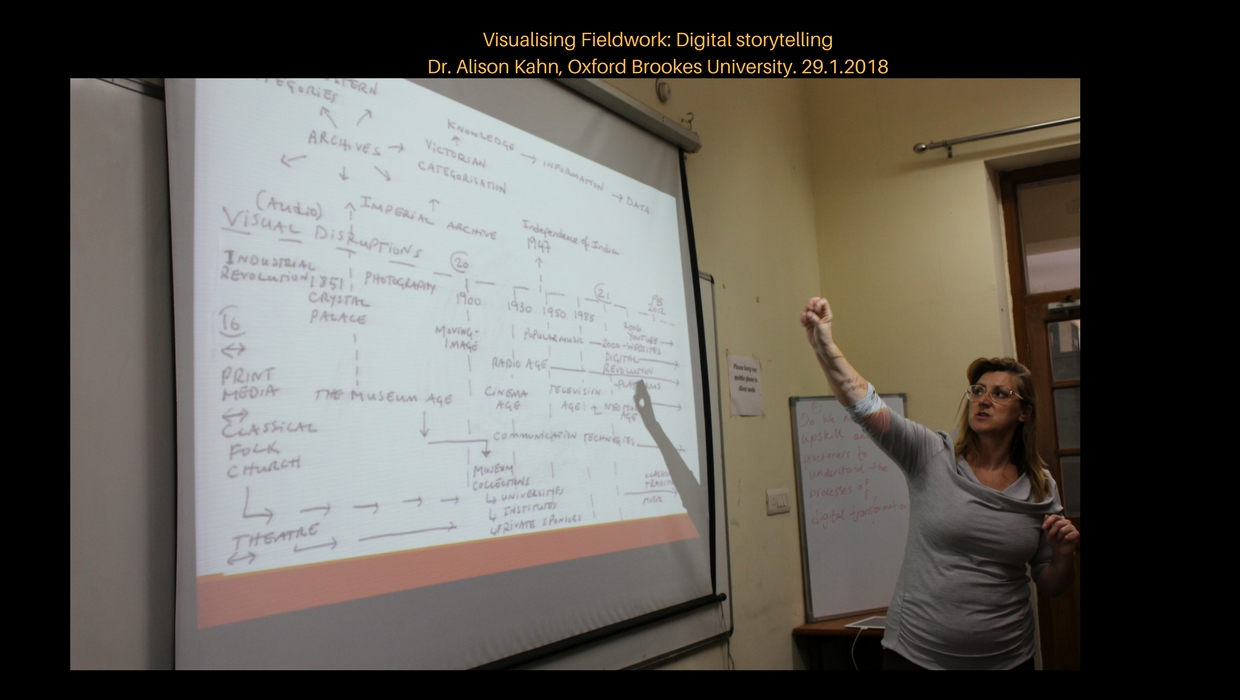|
A talk on 'Internationalization of Higher Education in India: Some Reflections' by Dr. Sanjay Kumar Sarangi, Academic Coordinator, International Office,
Utkal University | Department of Anthropology felicitates Felicitates
Research Scholars who contributed to Internationalization of Indian Anthropology abroad | 22nd November 2025 | 2:00 PM
Special Lecture on "Indigenous Amazonian Cosmologies:
Perspectivism, Kinship, and the Ontological
Instability of the Human/Non-Human Divide
" by Dr. Antonio Cerdeira Pilão, Marie Skłodowska-Curie Actions Fellow, Department of Sociology, Manchester Metropolitan University, at 3:30 PM, 3rd September 2025
Special Lecture on "Family and Kinship Studies Today: Thinking About the Universality of the Reproductive
Couple" by Dr. Antonio Cerdeira Pilão, Marie Skłodowska-Curie Actions Fellow, Department of Sociology, Manchester Metropolitan University, at 3:30 PM, 3rd September 2025
Special Lecture on"Mixed Methods and its Tools for Anthropological Holism" by M. Cameron Hay-Rollins,
Professor and Chair, Department of Anthropology, Miami University, at 3:30 PM, 4th September 2025
Special Lecture: 'How do we know what is good and right? Social Anthropology and the Anthropology of Ethics' by Soumhya Venkatesan, Professor of Social Anthropology, The University of Manchester |
Wednesday 22 January 2025 | 3:00 PM | Seminar Hall, Department of Anthropology, University of Delhi.
Special Lecture: 'Forensic Implications of New Criminal Laws' by Naushina Ali, Legal Counsel and Advocate, Hon'ble High Court of Chhattisgarh, Bilaspur | Saturday 18 January 2025 | 11:30 AM | Seminar Hall, Department of Anthropology, University of Delhi.
Distinguished Lecture: 'Locating Island Studies in India
A perspective from Majuli, Assam' by Dr Simashree Bora | 20.12.2024.
Distinguished Lecture 'On Palliative Care' by Dr Rajit Pahwa | 07.11.2024.
Special talk:'Culture and Sustainability:
An Anthropological Perspective on the Central Challenge of the 21st Century' by Prof. Thomas Reuter, University of Melbourne | Chaired by Prof. Subhadra Channa |
29th October 2024.
Special talk: 'Ageing in England- The Challenges of an Ageing Population' by Dr. Danni Collingridge Moore, International Observatory on End of Life, Lancaster University | 10th October 2024.
Special Lecture on 'Issues in Migration Studies' was delivered by
Dr. M.A. Kalam, Visiting Professor, Centre for Economic and Social Studies, Hyderabad, Visiting Professor, International Institute of Migration and
Development (IIMAD), Thiruvananthapuram, on 23 August 2024, 3:30PM.
A special Talk on 'Empowering Tribal Studies
Bridging Academia and Industry with Anthropology Skills' was delivered by Dr. Ritu Gairola Khanduri
University of Texas, Arlington on 31st July 2024, 3:30PM in the Seminar Hall
A special Talk on 'Sports Anthropology Today: Contemporary Concerns' was delivered by Dr. Anup Adhikari on 20th March 2024, 3 PM in the Seminar Hall
A special lecture on Ethnographic photography was delivered by Juan F. Cuyás, PhD candidate from Departament D'antropologia Social, Universitat De Barcelona, on 7th February 2023, 3:00 PM, Seminar Hall.
Chair: Dr. Avitoli G. Zhimo | Coordinated by Kanika Sharan and Taniya Gill (PhD scholars).
A special lecture on Graphic Politics in Eastern India: Script and the Quest for Autonomy was delivered by Nishaant Choksi on 9th March 2022, 3:30 PM, Seminar Hall. Chair: Prof. P.C.Joshi | Coordinated by Dr. Chakraverti Mahajan.
A special lecture on 'Artificial intelligence in cross cultural studies: An ethical input in development process' will be delivered by Prof. S. Sumathi, Professor Emeritus, Department of Anthropology, University of Madras on Wednesday 7th April 2021 at 3:00PM via Zoom online platform.
A panel discussion on
ETHNOGRAPHIC FIELDWORK AT ZE-MNUI was held
on Wednesday 19th February 2020 at 2:00 PM
in the Seminar Hall. Chair: Prof. P.C. Joshi, Moderator: Dr. Avitoli G. Zhimo.
Screening of "Untiring Mind"
a fim by Dr. Nabakumar Duarya, based on the life of B.S.Guha, the architect of Indian Anthropology, was held on
20th february 2020, at 2:00PM, Seminar Hall. Chair. Dr. R.P.Mitra.
Dr. Ravinder Singh, Head & Associate Professor at IHBAS Hospital delivered a talk on 21st November at 3:30 pm in the Seminar room.
Dr. Shweta Rawat from DRDO delivered a special lecture titled ‘Applied Anthropology: Defence perspective’, on the 24th October 2019 at 3:00 PM
As a part of the Eminent Lecture Series, Dr. T. N. Pandit, former Station Incharge of ASI, Andaman Islands, delivered a lecture titled ‘Tribes of
Andaman with special reference to Sentinel Islanders’ on Monday, 21st October 2019 at 3.00 p.m. in the Seminar Room.
Special Lecture on the topic RELATIONAL PERCEPTIONS OF THE PSYCHE:
PSYCHOLOGY-HISTORY-ANTHROPOLOGY was delivered by
Prof. Youval Rotman,
Senior Lecturer,
Department of Jewish History,
Tel Aviv University, on 18th October 2019
A special talk by Dr. Asaf Sharabi (Senior Lecturer, School of Behavioral Sciences, Peres Academic Center, Israel)
Is it God speaking? Identity and Agency of Deities in the Western Himalaya' held on September 6, 2019, 3 PM, Seminar Hall, Department of Anthropology, University of Delhi.
A special talk by Dr. Luisa Cortesi on "Land and Water in North Bihar: An Ontology" was held on 26th August 2019, at 11:00AM.
Click here for full report
EMINENT LECTURE SERIES:
Dr. Lalit Kumar, Former Adviser, Planning Commission, and an alumnus of the department delivered a lecture
titled ‘Application of Anthropological Knowledge in Studies of Tribal Welfare,
Communal Harmony, Civil Society and Sanitation & Hygiene’ on Friday the 12th April 2019.
Dr. Isabelle Lange, Medical Anthropologist, anthropologist working with an interdisciplinary
field of global health professionals at the London School of Hygiene and Tropical Medicine (LSHTM) in the UK
delivered a lecture on "Using layered ethnographic methods in clinical settings: the precarity of health workers in private maternal facilities in
Rajasthan"
on 15 November 2018 at 3.00 p.m. in the seminar room of the Department.
 
Bio: Dr. Isabelle Lange is a medical anthropologist working with an interdisciplinary field of global health professionals at the London
School of Hygiene and Tropical Medicine (LSHTM) in the UK.
Her research interests fall along two main, sometimes overlapping, lines. First is the anthropology of religious and spiritual belief,
and understanding identities of faith that influence, in particular, personal senses of meaning, health and well-being.
The second line largely surrounds maternal health in West and East Africa, employing ethnographic methods to investigate: patients’
perceptions of quality of care, hospital environments, quality improvement, care-seeking behaviors, health policy formation and transfer,
and knowledge exchange.
Her current research concerns private sector maternal care in India and Uganda, and international communication around policies and
guidelines in various consultation processes.
Abstract: Using layered ethnographic methods in clinical settings: The precarity of health workers in private maternal facilities in Rajasthan
As a result of a number of incentive schemes instituted over the last two decades in India, women are now more likely to deliver
their babies in medical centres rather than at home. Not only has the public health sector benefited from these initiatives – originally
aimed at meeting MDG targets and reducing maternal mortality – the private sector has as well, even though many of these clinics lie outside
of the regulation of the State. Using a layered, ethnographic approach focusing on four small non-corporate private maternity hospitals, I
turn a critical lens on what it means to work within a self-regulated system and examine the “creation” of a cadre of healthcare workers.
This paper examines how a space of care and business is generated out of the precarious positions of both women and the health workers who
depend on employment there.
Clinic owners’ staffing strategies centred around hiring unlicensed labour room staff, trained on the job rather than in accredited institutes,
who take care of all aspects of patient care, including deliveries. These staff work without rights or recourse, and, in their tenuous positions,
are out of the reach of government policies meant to standardize practices surrounding facility childbirth and staff working conditions:
few clinics in our sample received any monitoring visits from governmental bodies. Instead, they were involved in programs belonging to a
wave of global actors implementing initiatives to work with the private sector in terms of quality of care and service provision standards.
These programs operate at the intersections between the realities of clinic owners, professional associations, and central policy debates.
By exploring these narratives, this paper highlights the tensions between the value placed on profit, care and both patient and staff
rights in the health sector, and examines how unlicensed health workers are at once marginalized and at the same time in a position of
(re)asserting and re-imagining the standard guidelines surrounding maternal health practices of care seeking. Click here for Full report
|
|
|
Dr. Alison Khan, Visual Anthropologist/ Filmmaker, Senior Lecturer in Film and
Digital Media Production Oxford Brookes University delivered a lecture on
"Visualising fieldwork: Digital Storytelling" on 29 January 2018 at 3.00 p.m. in the seminar room of the Department.

Dr. Alison Kahn was trained as a museum and visual anthropologist at the universities of London (MA) and Oxford (MPhil, DPhil).
She works in both the media industry and in academia, lecturing on storytelling, professional practice and documentary
film theory and production in the Film and Digital Media Production department at Oxford Brookes University (OBU).
She has worked as a producer, researcher writer for the BBC, PBS and Discovery Channel. She is a senior lecturer at OBU,
where she integrate the use of audio-visual artefacts and digital media as tools and products of her research.
Her doctoral thesis was a fieldwork study investigating the Vatican's Ethnographic and Missionary Exhibition and Museum,
which is now in the Bodleian Library, Oxford. She has also worked in collaboration with the Pitt Rivers Museum, University of
Oxford on a documentary about the films of two women collector-filmmakers from the 1920s and 1930s,
called Captured by Women, which is open access.
She is currently working on two projects that deal with visual research.
A written monograph, The Other Great Exhibition: the Pontifical Missionary and Ethnological Exhibition in 1925; and a web-based
i-doc bringing together Naga and Anglo-Indian global diasporas to analyse colonial and post-colonial discourses.
Abstract
Digital technologies have fundamentally changed research practices in the sciences, social sciences,
and humanities. However, long-standing and effective methodologies should not be neglected if our pursuit of knowledge is to
be holistic and meaningful. Using case studies to discuss visual approaches to research I will explain some of the current
thinking around the praxis of audio-visual methods and techniques in the social sciences, and highlight the ongoing transformations
of research practices through Internet technologies.
Dr. Gurdeep Kaur, AIIMS will deliver a lecture on the topic entitle “Nutrition Assessment and planning – using Indian
Software- Dietcal” on 20 January 2018 at 3.00 p.m. in the Seminar room of the Department.
|
|



